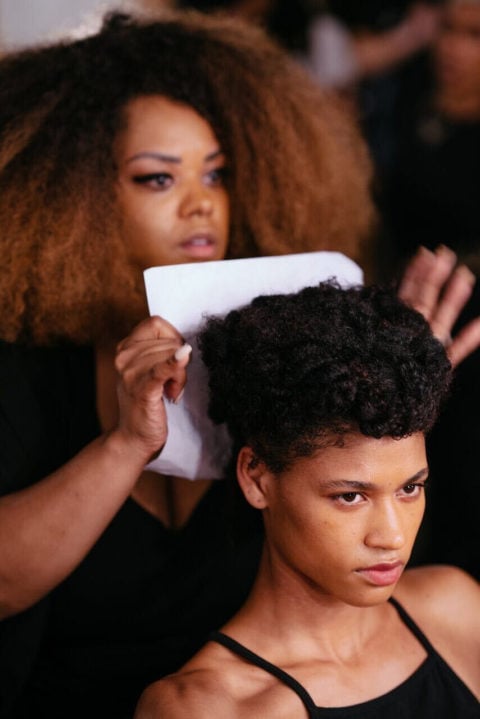Texture Talk: Blowout Curly Hair With Naeemah LaFond
Welcome to Texture Talk, a column that celebrates and deep dives into the dynamic world of curly hair, from crowns of curls that are free flowing to strands that are tucked away in a protective style.
Perfecting a blowout for textured hair at home can seem like a challenge, but according to Naeemah LaFond, a celeb and runway stylist who’s worked with Whitney Peak and Christopher John Rogers, it’s all about making sure you’re considering every single step of the process, including the products you’re using in the shower. Here, LaFond, who’s also the global artistic director for Amika, lays out how to perfect your textured hair blowout routine, one step at a time.

“A blowout consists of three steps, the wash, the prep, and the blowdry. Each step is super important to the end result, as is using products that are meant to not only go with your personal hair texture, but also your end goal,” says La Fond. For example, if you have very curly hair, but want a sleek and straight blow out, be sure to wash your hair with a shampoo that will help you extend those silky results.
Once out of the shower, prep your hair right away, since the sooner your hair begins to air dry the harder it will be to work against your natural texture. “Make sure you prep the hair to not only protect it against heat damage, but to also make sure it’s moisturized and nourished,” says LaFond. Spritz on a detangling protectant spray from root to tip, and for an extra layer of protection, apply a couple pumps of a lightweight hair oil that will act like a barrier against heat. If you have highlights in your curls, LaFond says to target those areas specifically with the oil to ensure they stay extra protected. “When working with textured hair, you always want to make sure you’re not damaging your curl pattern with the blowout, so you can always restore your original coil afterwards.”

One of the most important parts of ensuring a successful blowout is dividing your hair into sections before you get started. “Highly textured hair really expands as you’re blow drying it, so making sure you properly section, coil and clip up the hair you’re not working on ensures that the rest of your hair stays out of the way,” LaFond explains. Dividing the sections so they’re the same width as the brush you’re using will also allow you to completely dry one section at a time with more ease. An electric blowdry brush can make your life a lot easier since it does double-duty and frees up your hands. However, if you’re using a standard brush, consider how long it’s been lying around. “Women are always using brushes that they’ve had forever! If the bristles are bent or broken they’re going to damage your hair. Throw those old brushes out and invest in new ones that you’re able to glide through your hair easily. Sometimes it’s not your hair that is tangled; sometimes it’s the brush!”
Next, dry each section one at a time, working from top to bottom so you’re never putting wet hair on top of dried hair. “It’s important to start at the root first. It’s the area that is the toughest to smooth out, especially if it’s starting to dry on its own,” says LaFond. Once you’ve worked the root from all angles and you’re satisfied with the hair’s consistency, move to the end of the section, finishing with the middle (which tends to dry last). “Move like how you would brush your hair if it were dry. You can’t take a brush from the root and just move it all the way down. You have to start at the ends and work your way up to get those coils out and get it smooth.”
To get the most out of your completed blowout, smooth your strands with a few drops of hydrating hair oil. When you go to bed, wrap your hair into one large coil on the top of your head and keep it protected by covering it with a silk scarf. Be sure to wear a tight and secure shower cap to lock out humidity while you shower. Heading to the gym? LaFond suggests preventative measures: apply a dry shampoo to your roots and along your hairline, then cover with a sweatband to help absorb as much moisture as possible.






